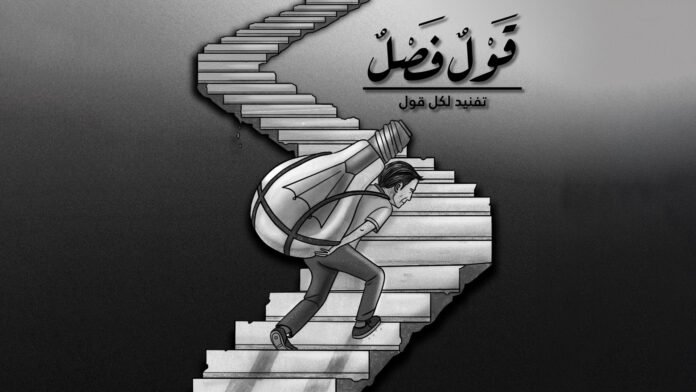In its fourth issue, the digital magazine Qawl Fassel covered 11 topics across various sections, along with current local and regional news. It also launched a new opinions section for legal experts to share their insights while continuing to publish content on its social media platforms.
First Week
In the first week of its fourth issue, the magazine published two articles: one in the Global Days section and the other in the Islamic section. Both articles focused on the theme of religious freedom in belief and practice.
Writer Rand Saad, in her article Commemorating Victims of Violence Based on Religion or Belief – August 22, highlighted the tendencies of extreme right-wing groups in various religions towards violence and exclusion, despite religion not being in conflict with individual freedom. She also addressed Islamophobia, which has cast a dark shadow over some societies, pointing out that Islam clearly states that there is no compulsion in religion, citing a video by Sheikh Ali Gomaa clarifying misconceptions about apostasy laws.
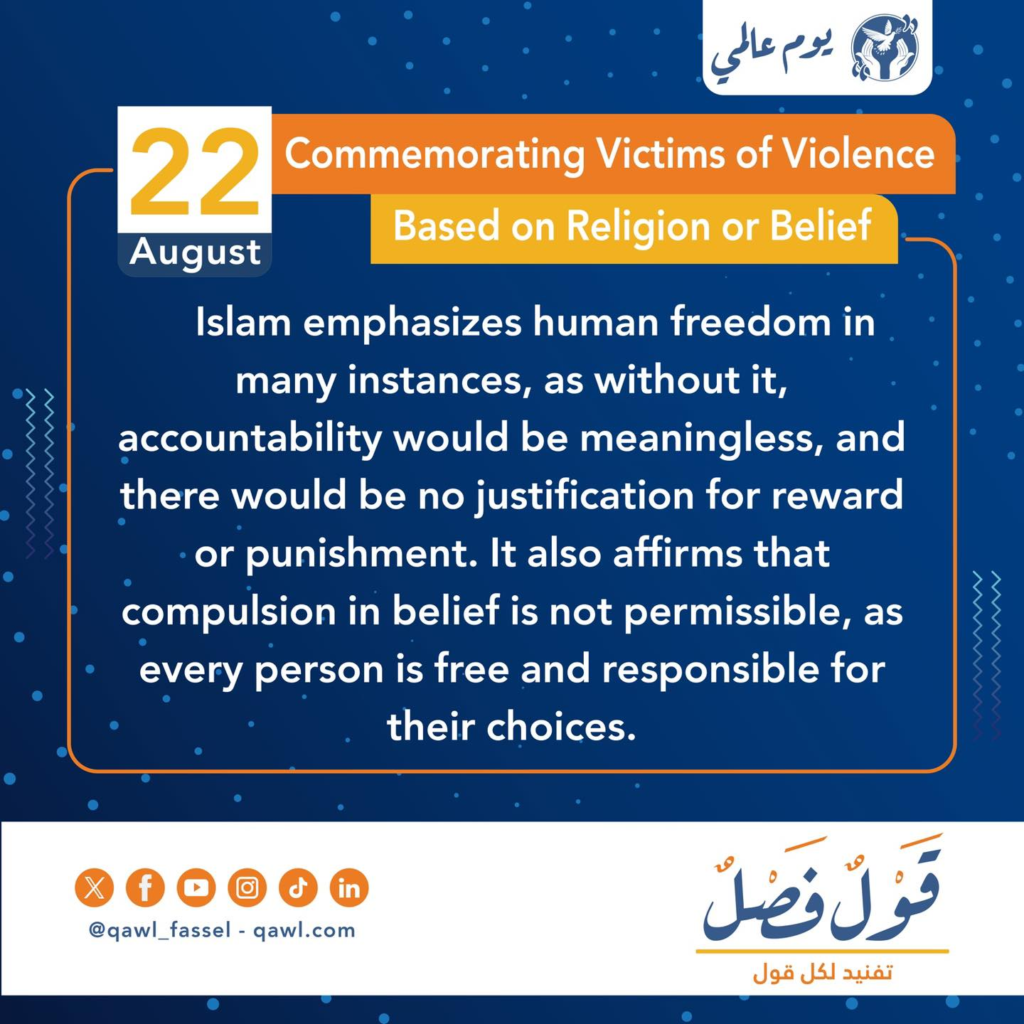
The second article of the week, written by Ahmad Okbelbab, titled Divine Sharia and Human Freedom, tackled issues related to the application of Sharia in law, often debated between secularists and Salafists. The author dedicated a significant part of the article to the relationship between freedom and Islamic Sharia, which, according to Dr Mohammed bin Mukhtar Al-Shinqiti, equates democracy with consultation (Shura). He argued that the implementation of Sharia is a natural outcome of society’s demand for it, rather than coercion and that Sharia, in essence, aligns with any benefit that does not conflict with a clear, unequivocal text.
Okbelbab noted that “many Salafists may not agree with Al-Shinqiti’s view that freedom is essential for true faith, seeing freedom as mere philosophical rhetoric detached from real-world power struggles.” He questioned, “Is a moral system sufficient to fulfil humanity’s dream of an ideal city, or is human selfishness, with all its inherent evils, impossible to fully overcome?”
Second Week
In its second week, Qawl Fassel published three articles in the Traffic, Crimes, and History sections.
Writer Yousif Al Hamadi explored the unique car number plate market in the Gulf in his article The Madness of Distinguished Number Plates: Between Investment and Social Status, examining its investment aspect. He noted that entering this market could generate substantial profits despite the plates being worth no more than a piece of metal. This led the author to delve into the psychological reasons that drive people to acquire them.

In the Crimes section, Ahmad Okbelbab wrote about an American murderer who committed intentional killings multiple times before his 20th birthday, only to spend the rest of his life in various prisons, including the infamous Alcatraz. During his imprisonment, he became an ornithologist with valuable scientific contributions, prompting the author to closely study his story, which he recounted in the article Robert Franklin Stroud: From Lifelong Inmate to Bird Expert .

Journalist Mohamed Elghazaly wrote in the History section an article titled Hammurabi’s Code: Between Deterrence and Humanity, discussing the evolution of law in ancient civilizations. Despite the harshness of some of its provisions, Hammurabi’s Code significantly influenced legal thought, providing foundations for regulating economic, commercial, and personal matters, particularly concerning women.
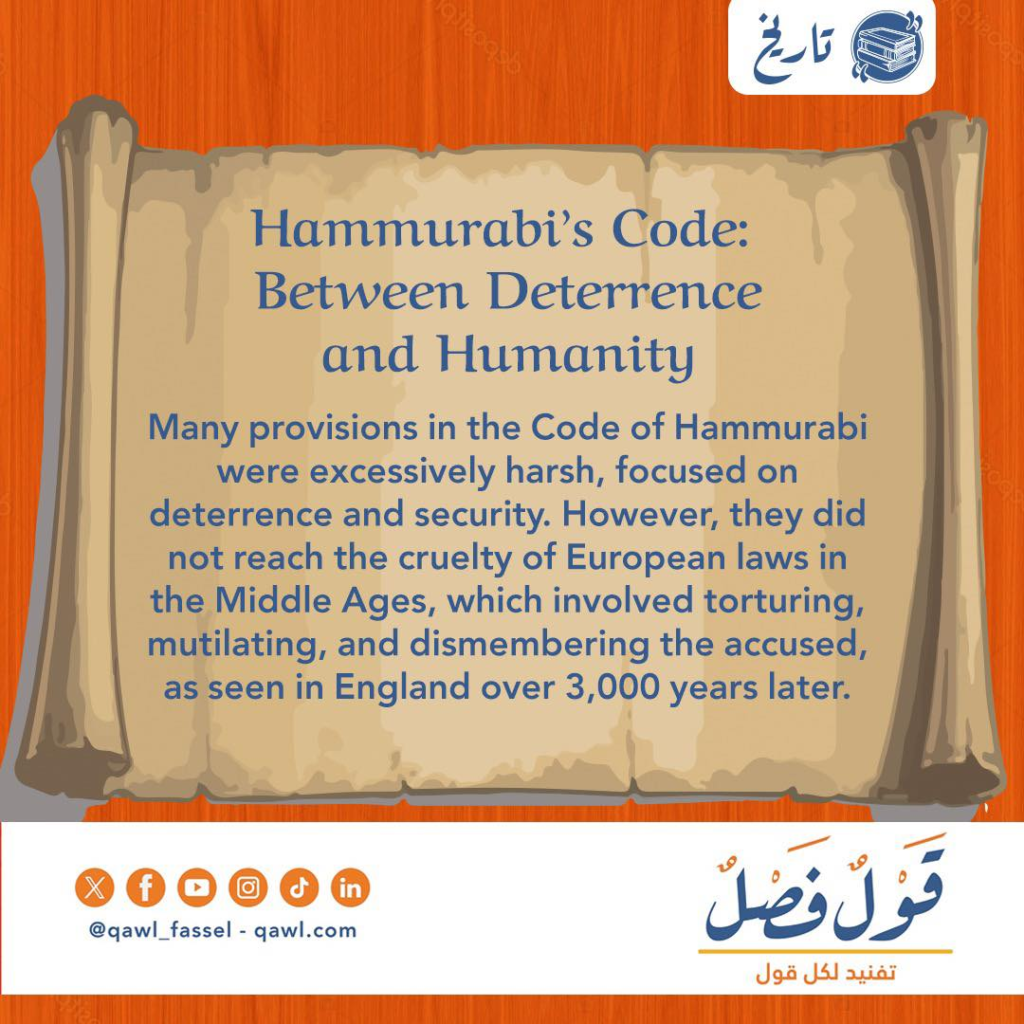
Elghazaly added, “Some might mistakenly think that Hammurabi’s Code was the first in Mesopotamia, but archaeological evidence shows that several earlier Babylonian codes contributed to its final form, prioritising order, security, and economy over justice.”
Third Week
The magazine published three articles in the Courts and Judiciary, Children, and Women sections in the third week of this issue.
In the Courts and Judiciary section, journalist Mohamed Elghazaly investigated Yahya Sinwar’s leadership of Hamas in his article Arab Despotism: Between Israel’s Democracy and Hamas’s Shura. He highlighted the Islamic Resistance Movement’s commitment to Sharia and consultation, detailing its history and how it allocates political and military roles, along with other specialized entities in media, advocacy, and social services, enhancing its operational effectiveness.
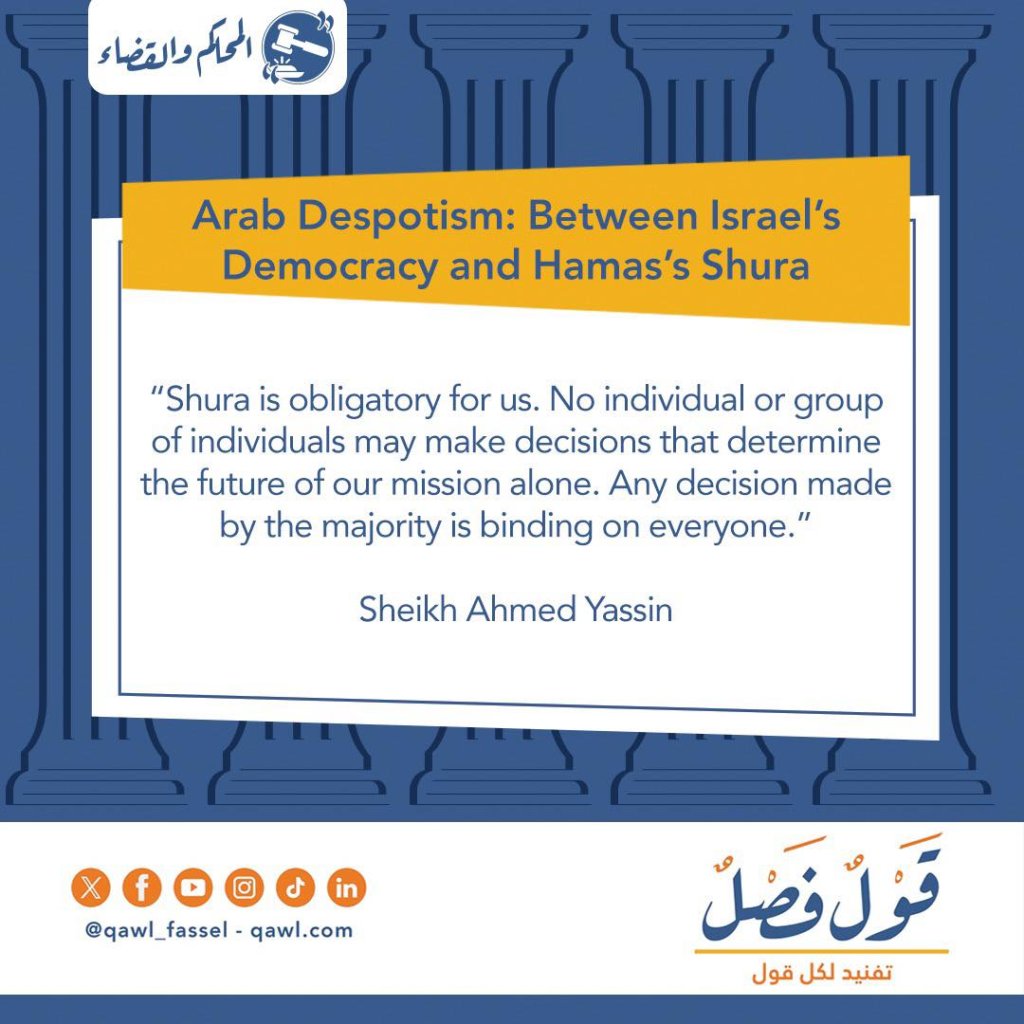
In the Women section, journalist Huda Mohamed tackled the topic of women in the judiciary in the Arab world, where female judgeships only emerged in the 20th century. Her article, The Arab Female Judge: Between Masculinity and the Demands of the Modern Era, explored the legal debate over this issue, presented statistics on female judges in several Arab countries, and concluded that women in the judiciary are now essential.

Rand Saad addressed a sensitive issue in the Children section related to abandoned children and paternity laws. Her article, Abandoned Children and Lineage Laws, discussed societal rejection of these innocent children and highlighted cases where mothers in Western countries abandon their infants in “baby boxes.” Some view these as extreme measures, while others see them as better alternatives to abandonment that leads to death. The article outlined the laws surrounding such cases and the emergency shelters that house these children.

Rand Saad remarked, “I had to visit some shelters to understand the causes, problems, and solutions related to abandoned children to gather enough information for my article. It was painful to discover that some mothers leave their newborns for fear of shame. I wondered about the harsh circumstances that forced them to step on their hearts without mercy. Praise be to God for well-being.”
Forth Week
In the fourth week of the same issue, the magazine featured three articles in the Expatriates, Locals, and Law sections.
In the Expatriates section, Ahmad Okbelbab discussed in his article Franchise Agreement: One Foot Here, One Foot There , the cross-border economic activity of franchising, where such ventures often appear local by contracting and training a local individual or entity to leverage their understanding of the market culture while paying a fee to the franchisor. In return, the franchisee benefits from the brand’s reputation, success, and organizational structure.

Huda Mohamed’s article in the Locals section titled Localization and Replacement: Strengthening National Cadres for a Sustainable Future highlighted Qatar’s focus on human development by investing in knowledge, science, and innovation, enabling citizens to assume roles in various sectors, especially administrative and sensitive ones, thereby reducing dependence on the high percentage of foreign workers and addressing demographic imbalances.
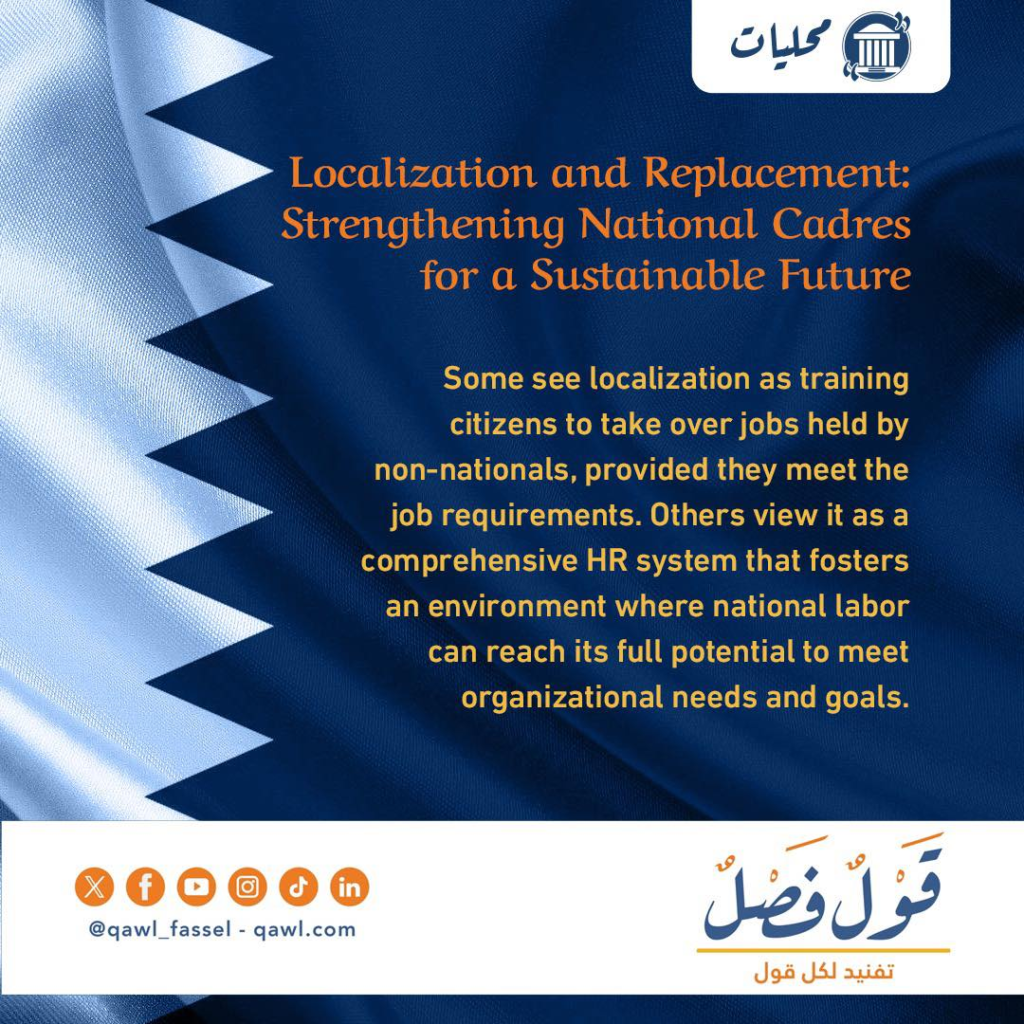
The final article of the issue, by Yousif Al Hamadi in the Law section titled Censorship of Media Works to Bridge the Gap Between Western Content and Community Values, addressed the problem of Western TV and movie content children watch. He discussed censorship standards in Qatar, noting that the only relevant legislation is Law No. 8 of 1979 concerning publications, predating modern technologies like computers, the internet, smartphones, and digital media, and still in force today.
Al Hamadi stated, “It’s time to establish a high-level official body to study contemporary media trends and set a vision for a project that upholds objective censorship standards while providing works that align with our culture, principles, and values without exposing our lives to imported, packaged products.”




